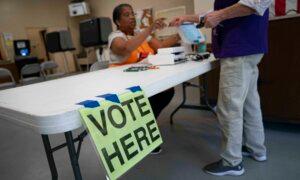Rep. Matt Gaetz Introduces Resolution Saying Trump Didn’t Engage in ‘Insurrection’
Rep. Matt Gaetz (R-Fla.) introduced a resolution on Feb. 6 to “authoritatively” state that former President Donald Trump did not commit “insurrection or rebellion” against the United States.
Sen. J.D. Vance (R-Ohio) has introduced companion legislation in the Senate.
The issue of insurrection has been raised in some 60 venues over the past six months and in two days will be argued before the U.S. Supreme Court as activists have contended that President Trump’s actions on Jan. 6, 2021, preclude him from running for office based on a Civil War-era statute.
“President Trump did not commit an insurrection,” Mr. Gaetz said. “Congress has a unique role in making that declaration. It’s not the job of the states and especially not the job of some bureaucrats in Colorado to make this assessment and interfere with the rights of voters to cast their vote for the candidate of their choice.”
The bill now has 63 co-sponsors, and Mr. Gaetz added that “many more” are expected to join in the coming days. Many who joined Mr. Gaetz to announce the resolution at a press conference were vocal supporters of President Trump, echoing his claims that the effort has been part of a “political witch hunt.”
Rep. Elise Stefanik (R-N.Y.) said the challenges to President Trump’s eligibility on the basis that Jan. 6 was an insurrection are the work of “extreme Democrats” who are “shredding the Constitution in the process.”
Rep. Brian Babin (R-Texas) claimed the ballot disqualification effort was a “desperate fourth-quarter Hail Mary” to knock down the leading Republican candidate.
“To block him from any ballot in any state is election interference, pure and simple,” said Mr. Babin.
Congress and Section 3
The 14th Amendment was ratified in the wake of the Civil War, granting citizenship and equal rights to all those born and naturalized in the United States.Section 3 was added to prevent those who abandoned their office to join the Confederacy from returning to their posts without a two-thirds vote from Congress. That section has seldom been used outside of a Civil War context, leaving many unanswered legal questions that interested parties hope the Supreme Court will answer once it hears oral arguments on Feb. 8.
In an amicus brief filed in the Supreme Court, 179 congressional Republicans argued that Congress has the right to vote on a Section 3 qualification all the way up to inauguration day, and that the statute bars one from holding office, not running for office. This interpretation would allow a candidate to whom Section 3 applies to be included on all the primary ballots, run in the general election, be elected president, and then have Congress determine whether he will be allowed to serve as president by a vote in both Houses.
Some attorneys for President Trump have also argued that the impeachment vote in Congress served to exonerate him. A week after Jan. 6, the House voted to impeach President Trump, charging him with incitement to insurrection. He was then acquitted in the Senate.
Some judges have dismissed the argument, finding that a vote to acquit President Trump of incitement to insurrection was not the same as a two-thirds vote from Congress to allow President Trump to hold office.
Trump Files Brief Days Before Hearing
On Feb. 5, President Trump filed his reply brief in the Supreme Court case. Much of the argument focuses on the interpretation that the president of the United States is not the kind of “officer” written about in Section 3.The text includes a long list of officers, beginning with senators and representatives in Congress and descending in level, ending with a catch-all “officer of the United States.”
A Colorado trial court that first found President Trump had engaged in “insurrection” had ordered the state secretary to include him on the ballot because the office of president is not listed in Section 3.
Attorneys for President Trump presented a different argument, that the “officers” referenced in the Constitution are appointed officials, not elected officials.


No comments:
Post a Comment